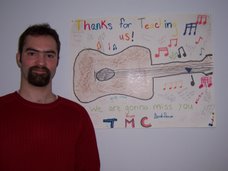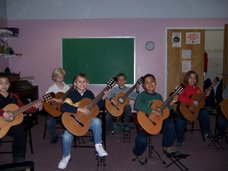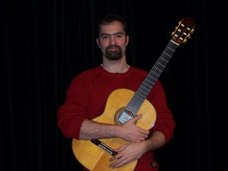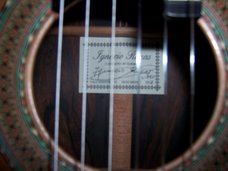
The following is a very interesting interview with Pam Kimmel. Not only is she a great person, but she has alot of experience. Guitarists young and old can learn from what she has to say.
MCM: Could you give a brief synopsis of your career as a guitarist?
PK: I became interested in the guitar through folk music in high-school. I really liked finger-style and I went to the Old-Town School of Folk Music and took lessons there. My teacher there suggested that I take classical lessons. I had always been interested in classical music and I played the piano as a child. I started classical lessons there and after a year he recommended me for a teaching job which I got. He also told me about a master class in Mexico with Manuel Lopez-Ramos, and this was after 1 year of classical playing. It was a month long master class in Mexico and we had lessons all morning long. So it was a fabulous experience and after that I knew I needed to change teachers. So when I got back to Chicago I started with Jack Cecchini who was also at the master class.
MCM: A month long class! That sounds fantastic.
PK: It was wonderful. There were a lot of people there and it was a lot fun, kind of a resort town. The students on the whole, were not very advanced but it was also my first contact with Manuel Lopez-Ramos which lasted throughout my life. Unfortunately, he died last June. So after a while Jack Cecchini asked me if I wanted to teach for him. So basically most of my work has been handed to me by teachers in one way or another. So I taught with him and studied with him for many years. Throughout the years I went to other classes with Lopez-Ramos. Eventually Jack got a job teaching at DePaul and asked me to be his assistant so I did that for a year. This was the first university guitar program in Chicago.
MCM. So you were teaching undergraduates?
PK. Yes. After a while Roosevelt University was looking for a teacher and I started teaching part time at Roosevelt. Jack did too but it never quite worked out. So I quit DePaul.
MCM: What year was this?
PK: I started here in 1972 and developed their first degreed program in classical guitar. In 1975 they offered me a full time position. End of story.
MCM: So it basically was who you knew and the teachers you knew. Could you now talk about your very early teaching? Did you feel that you knew what you were doing? What was the turnover like? Did you generally keep most students once you had them?
PK: It was pretty steady. I felt confident because I had a teaching system that was handed down through Lopez-Ramos and Cecchini. They were very organized and I felt confident following their teaching examples. I knew it worked since they had many successful students. I had seen it work. I knew what books to use in what order. It is good to have a system. It is also good not to stay with the same system forever, but to keep reading and being open to new ideas so that eventually you develop your own system, but it is good to have something to start with.
MCM: What was the system?
PK: It depends on the students. If a student cannot read you need to use a book that teaches reading, Noad or Shearer for example. Shearer was the first book that I used then I moved towards Noad. Once a student could read, Sagreras and the beginning Carruli books were the best things because they complement each other very well. Also scale work, technique work, slurs, Sor studies, Carcassi studies and repertoire that is at the student's level.
MCM: When did you feel that you had finally made it as a classical guitarist and a teacher?
PK: When I got the full time job at Roosevelt University. I wasn’t worried about tenure although maybe I should have been.
MCM: So back to the early teaching did you feel unsure about your future? Or were you always confident?
PK: It was a mixed bag. It wasn’t that hard to make the rent and I hoped that it would all work out. From what I remember anyway, it was a long time ago.
MCM: Were you able to perform as well?
PK: Yes I did.
MCM: What were some of the factors that helped you find performances?
PK: Well I was always involved with the guitar society. Obviously the more people you know the better. For example, a man who was a student at the master class in Mexico lived in Indianapolis and had a connection with the guitar society there. So I played for that classical guitar society. Knowing how to talk to people is as important as how you play. However, you have to be able to play well or it won’t continue. Social skills are very important.
MCM: Did teaching help you as a performer?
PK: Hmm that is a good question. I don’t think so. I think maybe you mean did you learn from your students, and the answer is yes definitely.
MCM: So the Chicago Classical Guitar Society was a big factor?
PK: Well it was one factor. I think what you need to do is to plant seeds in many different areas. I was a member of the guitar society. I maintained contact with my teachers. For an example of good networking, a nice fellow I met at the GFA last year was moving to Chicago. When I got back to Chicago I had an email from him, a very pleasant email just saying it was nice to meet you. It wasn’t phony; he just knows how to network. I got another email a couple of months later. So he is maintaining the contact. For him I am a little seed in Chicago. He has asked me where to get jobs in Chicago. I think that things like your Blog, the Chicago Classical Guitar Society, and maintaining contact with your teachers are all little seeds. Maybe they will grow, maybe they won’t.
MCM: I know that you are the president of the Chicago Classical Guitar Society. How did you achieve this position?
PK. Well no one else wanted it. (Laughter)
MCM: I wasn’t expecting that.
PK: Well when the last President left I got it.
MCM: As a professor and known commodity in Chicago do you actively help students and graduates in Chicago.
PK: Yes, I feel it is part of my job. When people choose to be in an artistic field, it is very difficult. People need all the help they can get. The jobs are not out there. You must create your own niche. You must create your position. You might find a job somewhere but you need to create you own niche. That takes a certain kind of personality and entrepreneurship. In the old days people went around and played and hoped to have an album made. They had business cards and brochures. Today you have a CD and a web site before you get the job. Sometimes the playing is not very good, but they have all this other stuff that makes it seem like it could be good. It is very much the opposite of what it was. The CD had become the business card. As the president of the Classical Guitar society I get about two emails a day from players all over the world who are trying to get performances here. I couldn’t possibly answer them all. There will be a lot of people who you send stuff to that never get back to you.
MCM: Do students ever just disappear off the map.
PK: Oh yes, it is always very upsetting. Sometimes they get a job in another field and move out of town. Often they don’t continue to play. I have had students go to law school I have a student who became a recording engineer. I have a lot of students going into computer work; there is some kind of connection there. Some play pop music and gig that way because they can make money. They find their own way and it might not be through playing. Then there is my student Julie Goldberg who went on to get the first Doctoral Degree in Classical Guitar from Northwestern. I am always happy if a student goes on to get into a good graduate program. People are people and they have their different ways and you never know who is going to stick with it. I had one student who went into computers he was a wonderful player, very sophisticated musically. I saw him years later and we had lunch and he told me he never had that entrepreneurial drive he didn’t like doing it and didn’t want to do it. He just did not have the drive or the desire even though he was a fantastic player.
MCM: What teaching tips could you give to young teachers to attract and keep students?
PK: I think involving the student in making musical goals. What are your goals? What would you like to learn? Here are my goals for you, but what are yours? Keeping students involved in these kinds of decisions is good. Say a student wants to learn some blues or something. What do you do? There is nothing wrong with giving a student some candy after they have had their meat and potatoes. That helps them musically too. When you give them something they want, it keeps them around. It is also good on a weekly basis to give them a classical CD to listen to or just one piece. Even pieces you think they might like to play themselves.
MCM: In your opinion what are one or two of the most important things a guitarist can do to make it?
PK: Well we’ve gone over this but I think networking and continuing to study is very important. Master classes and different viewpoints are very important. I think the one thing I regret is that I didn’t go to many more teachers as I was coming up. It is very good to get out there and attend master classes. There are many ways to play the guitar and many musical ideas you just have to keep learning.
MCM: Excellent advice.





No comments:
Post a Comment